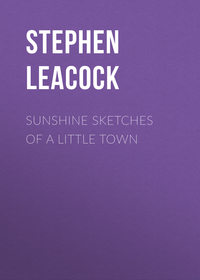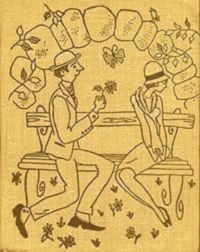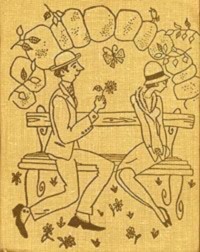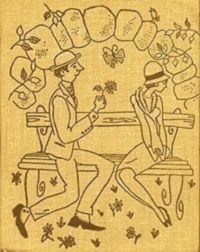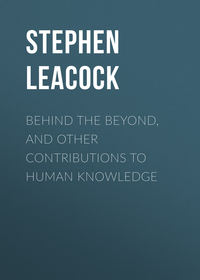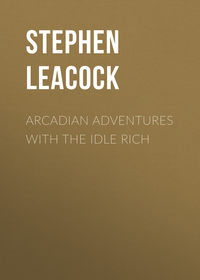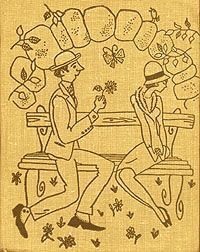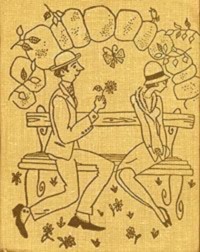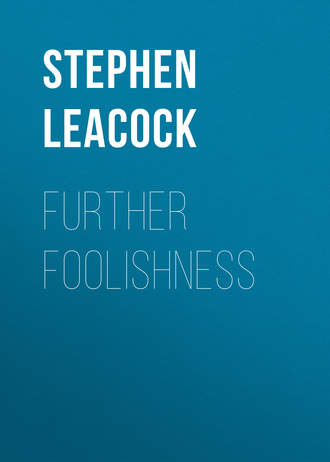 полная версия
полная версияFurther Foolishness
"Where does it say that?" screamed Abdul.
"Here beside my thumb."
"I can't do it, I can't do it," moaned the little Sultan.
"More than that further," went on the Prussian quite undisturbed, "you state hereby your fixed resolve, rather than give in, to cast yourself from the highest pinnacle of the topmost minaret of this palace."
"Oh, not the highest; don't make it the highest," moaned Abdul.
"Your purpose is fixed. Nothing can alter it. Unless the Allied Powers withdraw from their advance on Constantinople you swear that within one hour you will fill your mouth with mud and burn yourself alive."
"Just Allah!" cried the Sultan. "Does it say all that?"
"All that," said Von der Doppelbauch. "All that within an hour. It is a splendid defiance. The Kaiser himself has seen it and admired it. 'These,' he said, 'are the words of a man!'"
"Did he say that?" said Abdul, evidently flattered. "And is he too about to hurl himself off his minaret?"
"For the moment, no," replied Von der Doppelbauch sternly.
"Well, well," said Abdul, and to my surprise he began picking up the pen and making ready. "I suppose if I must sign it, I must." Then he marked the paper and sprinkled it with sand. "For one hour? Well, well," he murmured. "Von der Doppelbauch Pasha," he added with dignity, "you are permitted to withdraw. Commend me to your Imperial Master, my brother. Tell him that, when I am gone, he may have Constantinople, provided only"—and a certain slyness appeared in the Sultan's eye—"that he can get it. Farewell."
The Field-Marshal, majestic as ever, gathered up the manifesto, clicked his heels together and withdrew.
As the door closed behind him, I had expected the little Sultan to fall into hopeless collapse.
Not at all. On the contrary, a look of peculiar cheerfulness spread over his features.
He refilled his narghileh and began quietly smoking at it.
"Toomuch," he said, quite cheerfully, "I see there is no hope."
"Alas!" said the secretary.
"I have now," went on the Sultan, "apparently but sixty minutes in front of me. I had hoped that the intervention of the United States might have saved me. It has not. Instead of it, I meet my fate. Well, well, it is Kismet. I bow to it."
He smoked away quite cheerfully.
Presently he paused.
"Toomuch," he said, "kindly go and fetch me a sharp knife, double-edged if possible, but sharp, and a stout bowstring."
Up to this time I had remained a mere spectator of what had happened. But now I feared that I was on the brink of witnessing an awful tragedy.
"Good heavens, Abdul," I said, "what are you going to do?"
"Do? Why kill myself, of course," the Sultan answered, pausing for a moment in an interval of his cheerful smoking. "What else should I do? What else is there to do? I shall first stab myself in the stomach and then throttle myself with the bowstring. In half an hour I shall be in paradise. Toomuch, summon hither from the inner harem Fatima and Falloola; they shall sit beside me and sing to me at the last hour, for I love them well, and later they too shall voyage with me to paradise. See to it that they are both thrown a little later into the Bosphorus, for my heart yearns towards the two of them," and he added thoughtfully, "especially perhaps towards Fatima, but I have never quite made up my mind."
The Sultan sat back with a little gurgle of contentment, the rose water bubbling soothingly in the bowl of his pipe.
Then he turned to his secretary again.
"Toomuch," he said, "you will at the same time send a bowstring to Codfish Pasha, my Chief of War. It is our sign, you know," he added in explanation to me—"it gives Codfish leave to kill himself. And, Toomuch, send a bowstring also to Beefhash Pasha, my Vizier—good fellow, he will expect it—and to Macpherson Effendi, my financial adviser. Let them all have bowstrings."
"Stop, stop," I pleaded. "I don't understand."
"Why surely," said the little man, in evident astonishment, "it is plain enough. What would you do in Canada? When your ministers—as I think you call them—fail and no longer enjoy your support, do you not send them bowstrings?"
"Never," I said. "They go out of office, but—"
"And they do not disembowel themselves on their retirement? Have they not that privilege?"
"Never!" I said. "What an idea!"
"The ways of the infidel." said the little Sultan, calmly resuming his pipe, "are beyond the compass of the true intelligence of the Faithful. Yet I thought it was so even as here. I had read in your newspapers that after your last election your ministers were buried alive—buried under a landslide, was it not? We thought it—here in Turkey—a noble fate for them."
"They crawled out," I said.
"Ishmillah!" ejaculated Abdul. "But go, Toomuch. And listen, thou also—for in spite of all thou hast served me well—shalt have a bowstring."
"Oh, master, master," cried Toomuch, falling on his knees in gratitude and clutching the sole of Abdul's slipper. "It is too kind!"
"Nay, nay," said the Sultan. "Thou hast deserved it. And I will go further. This stranger, too, my governess, this professor, bring also for the professor a bowstring, and a two-bladed knife! All Canada shall rejoice to hear of it. The students shall leap up like young lambs at the honour that will be done. Bring the knife, Toomuch; bring the knife!"
"Abdul," I said, "Abdul, this is too much. I refuse. I am not fit. The honour is too great."
"Not so," said Abdul. "I am still Sultan. I insist upon it. For, listen, I have long penetrated your disguise and your kind design. I saw it from the first. You knew all and came to die with me. It was kindly meant. But you shall die no common death; yours shall be the honour of the double knife—let it be extra sharp, Toomuch—and the bowstring."
"Abdul," I urged, "it cannot be. You forget. I have an appointment to be thrown into the Bosphorus."
"The death of a dog! Never!" cried Abdul. "My will is still law. Toomuch, kill him on the spot. Hit him with the stool, throw the coffee at him—"
But at this moment there were heard loud cries and shouting as in tones of great gladness, in the outer hall of the palace, doors swinging to and fro and the sound of many running feet. One heard above all the call, "It has come! It has come!"
The Sultan looked up quickly.
"Toomuch," he said eagerly and anxiously, "quick, see what it is. Hurry! hurry! Haste! Do not stay on ceremony. Drink a cup of coffee, give me five cents—fifty cents, anything—and take leave and see what it is."
But before Toomuch could reply, a turbaned attendant had already burst in through the door unannounced and thrown himself at Abdul's feet.
"Master! Master!" he cried. "It is here. It has come." As he spoke he held out in one hand a huge envelope, heavy with seals. I could detect in great letters stamped across it the words, WASHINGTON and OFFICE OF THE SECRETARY OF STATE.
Abdul seized and opened the envelope with trembling hands.
"It is it!" he cried. "It is sent by Smith Pasha, Minister under the Peace of Heaven of the United States. It is the Intervention. I am saved."
Then there was silence among us, breathless and anxious.
Abdul glanced down the missive, reading it in silence to himself.
"Oh noble," he murmured. "Oh generous! It is too much. Too splendid a lot!"
"What does it say?"
"Look," said the Sultan. "The United States has used its good offices. It has intervened! All is settled. My fate is secure."
"Yes, yes," I said, "but what is it?"
"Is it believable?" exclaimed Abdul. "It appears that none of the belligerents cared about me at all. None had designs upon me. The war was not made, as we understood, Toomuch, as an attempt to seize my person. All they wanted was Constantinople. Not me at all!"
"Powerful Allah!" murmured Toomuch. "Why was it not so said?"
"For me," said the Sultan, still consulting the letter, "great honours are prepared! I am to leave Constantinople —that is the sole condition. It shall then belong to whoever can get it. Nothing could be fairer. It always has. I am to have a safe conduct—is it not noble?—to the United States. No one is to attempt to poison me—is it not generosity itself?—neither on land nor even—mark this especially, Toomuch—on board ship. Nor is anyone to throw me overboard or otherwise transport me to paradise."
"It passes belief!" murmured Toomuch Koffi. "Allah is indeed good."
"In the United States itself," went on Abdul, "or, I should say, themselves, Toomuch, for are they not innumerable? I am to have a position of the highest trust, power and responsibility."
"Is it really possible?" I said, greatly surprised.
"It is so written," said the Sultan. "I am to be placed at the head, as the sole head or sovereign of—how is it written?—a Turkish Bath Establishment in New York. There I am to enjoy the same freedom and to exercise just as much—it is so written—exactly as much political power as I do here. Is it not glorious?"
"Allah! Illallah!" cried the secretary.
"You, Toomuch, shall come with me, for there is a post of great importance placed at my disposal—so it is written—under the title of Rubber Down. Toomuch, let our preparations be made at once. Notify Fatima and Falloola. Those two alone shall go, for it is a Christian country and I bow to its prejudices. Two, I understand, is the limit. But we must leave at once."
The Sultan paused a moment and then looked at me.
"And our good friend here," he added, "we must leave to get out of this Yildiz Kiosk by whatsoever magic means he came into it."
Which I did.
And I am assured, by those who know, that the intervention was made good and that Abdul and Toomuch may be seen to this day, or to any other day, moving to and fro in their slippers and turbans in their Turkish Bath Emporium at the corner of Broadway and—
But stop; that would be saying too much, especially as Fatima and Falloola occupy the upstairs.
And it is said that Abdul has developed a very special talent for heating up the temperature for his Christian customers.
Moreover, it is the general opinion that, whether or not the Kaiser and such people will get their deserts, Abdul Aziz has his.
XIII. In Merry Mexico
I stood upon the platform of the little deserted railway station of the frontier and looked around at the wide prospect. "So this," I said to myself, "is Mexico!"
About me was the great plain rolling away to the Sierras in the background. The railroad track traversed it in a thin line. There were no trees—only here and there a clump of cactus or chaparral, a tuft of dog-grass or a few patches of dogwood. At intervals in the distance one could see a hacienda standing in majestic solitude in a cup of the hills. In the blue sky floated little banderillos of white cloud, while a graceful hidalgo appeared poised on a crag on one leg with folded wings, or floated lazily in the sky on one wing with folded legs.
There was a drowsy buzzing of cicadas half asleep in the cactus cups, and, from some hidden depth of the hills far in the distance, the tinkling of a mule bell.
I had seen it all so often in moving pictures that I recognised the scene at once.
"So this is Mexico?" I repeated.
The station building beside me was little more than a wooden shack. Its door was closed. There was a sort of ticket wicket opening at the side, but it too was closed.
But as I spoke thus aloud, the wicket opened. There appeared in it the head and shoulders of a little wizened man, swarthy and with bright eyes and pearly teeth.
He wore a black velvet suit with yellow facings, and a tall straw hat running to a point. I seemed to have seen him a hundred times in comic opera.
"Can you tell me when the next train—?" I began.
The little man made a gesture of Spanish politeness.
"Welcome to Mexico!" he said.
"Could you tell me—?" I continued.
"Welcome to our sunny Mexico!" he repeated—"our beautiful, glorious Mexico. Her heart throbs at the sight of you."
"Would you mind—?" I began again.
"Our beautiful Mexico, torn and distracted as she is, greets you. In the name of the de facto government, thrice welcome. Su casa!" he added with a graceful gesture indicating the interior of his little shack. "Come in and smoke cigarettes and sleep. Su casa! You are capable of Spanish, is it not?"
"No," I said, "it is not. But I wanted to know when the next train for the interior—"
"Ah!" he rejoined more briskly. "You address me as a servant of the de facto government. Momentino! One moment!"
He shut the wicket and was gone a long time. I thought he had fallen asleep.
But he reappeared. He had a bundle of what looked like railway time tables, very ancient and worn, in his hand.
"Did you say," he questioned, "the _in_terior or the _ex_terior?"
"The interior, please."
"Ah, good, excellent—for the interior." The little Mexican retreated into his shack and I could hear him murmuring, "For the interior, excellent," as he moved to and fro.
Presently he reappeared, a look of deep sorrow on his face.
"Alas," he said, shrugging his shoulders, "I am desolado! It has gone! The next train has gone!"
"Gone! When?"
"Alas, who can tell? Yesterday, last month? But it has gone."
"And when will there be another one?" I asked.
"Ha!" he said, resuming a brisk official manner. "I understand. Having missed the next, you propose to take another one. Excellent! What business enterprise you foreigners have! You miss your train! What do you do? Do you abandon your journey? No. Do you sit down—do you weep? No. Do you lose time? You do not."
"Excuse me," I said, "but when is there another train?"
"That must depend," said the little official, and as he spoke he emerged from his house and stood beside me on the platform fumbling among his railway guides. "The first question is, do you propose to take a de facto train or a de jure train?"
"When do they go?" I asked.
"There is a de jure train," continued the stationmaster, peering into his papers, "at two p.m. A very good train—sleepers and diners—one at four, a through train—sleepers, observation car, dining car, corridor compartments—that also is a de jure train—"
"But what is the difference between the de jure and the de facto?"
"It's a distinction we generally make in Mexico. The de jure trains are those that ought to go; that is, in theory, they go. The de facto trains are those that actually do go. It is a distinction clearly established in our correspondence with Huedro Huilson."
"Do you mean Woodrow Wilson?"
"Yes, Huedro Huilson, president—de jure—of the United States."
"Oh," I said. "Now I understand. And when will there be a de facto train?"
"At any moment you like," said the little official with a bow.
"But I don't see—"
"Pardon me, I have one here behind the shed on that side track. Excuse me one moment and I will bring it."
He disappeared and I presently saw him energetically pushing out from behind the shed a little railroad lorry or hand truck.
"Now then," he said as he shoved his little car on to the main track, "this is the train. Seat yourself. I myself will take you."
"And how much shall I pay? What is the fare to the interior?" I questioned.
The little man waved the idea aside with a polite gesture.
"The fare," he said, "let us not speak of it. Let us forget it How much money have you?"
"I have here," I said, taking out a roll of bills, "fifty dollars—"
"And that is all you have?"
"Yes."
"Then let that be your fare! Why should I ask more? Were I an American, I might; but in our Mexico, no. What you have we take; beyond that we ask nothing. Let us forget it. Good! And, now, would you prefer to travel first, second, or third class?"
"First class please," I said.
"Very good. Let it be so." Here the little man took from his pocket a red label marked FIRST CLASS and tied it on the edge of the hand car. "It is more comfortable," he said. "Now seat yourself, seize hold of these two handles in front of you. Move them back and forward, thus. Beyond that you need do nothing. The working of the car, other than the mere shoving of the handles, shall be my task. Consider yourself, in fact, senor, as my guest."
We took our places. I applied myself, as directed, to the handles and the little car moved forward across the plain.
"A glorious prospect," I said, as I gazed at the broad panorama.
"Magnifico! Is it not?" said my companion. "Alas, my poor Mexico! She want nothing but water to make her the most fertile country of the globe! Water and soil, those only, and she would excel all others. Give her but water, soil, light, heat, capital and labour, and what could she not be! And what do we see? Distraction, revolution, destruction—pardon me, will you please stop the car a moment? I wish to tear up a little of the track behind us."
I did as directed. My companion descended, and with a little bar that he took from beneath the car unloosed a few of the rails of the light track and laid them beside the road.
"It is our custom," he explained, as he climbed on board again. "We Mexicans, when we move to and fro, always tear up the track behind us. But what was I saying? Ah, yes—destruction, desolation, alas, our Mexico!"
He looked sadly up at the sky.
"You speak," I said, "like a patriot. May I ask your name?"
"My name is Raymon," he answered, with a bow, "Raymon Domenico y Miraflores de las Gracias."
"And may I call you simply Raymon?"
"I shall be delirious with pleasure if you will do so," he answered, "and dare I ask you, in return, your business in our beautiful country?"
The car, as we were speaking, had entered upon a long gentle down-grade across the plain, so that it ran without great effort on my part.
"Certainly," I said. "I'm going into the interior to see General Villa!"
At the shock of the name, Raymon nearly fell off the car.
"Villa! General Francesco Villa! It is not possible!"
The little man was shivering with evident fear.
"See him! See Villa! Not possible. Let me show you a picture of him instead? But approach him—it is not possible. He shoots everybody at sight!"
"That's all right," I said. "I have a written safe conduct that protects me."
"From whom?"
"Here," I said, "look at them—I have two."
Raymon took the documents I gave him and read aloud:
"'The bearer is on an important mission connected with American rights in Mexico. If anyone shoots him he will be held to a strict accountability. W. W.' Ah! Excellent! He will be compelled to send in an itemised account. Excellent! And this other, let me see. 'If anybody interferes with the bearer, I will knock his face in. T. R.' Admirable. This is, if anything, better than the other for use in our country. It appeals to our quick Mexican natures. It is, as we say, simpatico. It touches us."
"It is meant to," I said.
"And may I ask," said Raymon, "the nature of your business with Villa?"
"We are old friends," I answered. "I used to know him years ago when he kept a Mexican cigar store in Buffalo. It occurred to me that I might be able to help the cause of peaceful intervention. I have already had a certain experience in Turkey. I am commissioned to make General Villa an offer."
"I see," said Raymon. "In that case, if we are to find Villa let us make all haste forward. And first we must direct ourselves yonder"—he pointed in a vague way towards the mountains—"where we must presently leave our car and go on foot, to the camp of General Carranza."
"Carranza!" I exclaimed. "But he is fighting Villa!"
"Exactly. It is possible—not certain—but possible, that he knows where Villa is. In our Mexico when two of our generalistas are fighting in the mountains, they keep coming across one another. It is hard to avoid it."
"Good," I said. "Let us go forward."
It was two days later that we reached Carranza's camp in the mountains.
We found him just at dusk seated at a little table beneath a tree.
His followers were all about, picketing their horses and lighting fires.
The General, buried in a book before him, noticed neither the movements of his own men nor our approach.
I must say that I was surprised beyond measure at his appearance.
The popular idea of General Carranza as a rude bandit chief is entirely erroneous.
I saw before me a quiet, scholarly-looking man, bearing every mark of culture and refinement. His head was bowed over the book in front of him, which I noticed with astonishment and admiration was Todhunter's Algebra. Close at his hand I observed a work on Decimal Fractions, while, from time to time, I saw the General lift his eyes and glance keenly at a multiplication table that hung on a bough beside him.
"You must wait a few moments," said an aide-de-camp, who stood beside us. "The General is at work on a simultaneous equation!"
"Is it possible?" I said in astonishment.
The aide-de-camp smiled.
"Soldiering to-day, my dear Senor," he said, "is an exact science. On this equation will depend our entire food supply for the next week."
"When will he get it done?" I asked anxiously.
"Simultaneously," said the aide-de-camp.
The General looked up at this moment and saw us.
"Well?" he asked.
"Your Excellency," said the aide-de-camp, "there is a stranger here on a visit of investigation to Mexico."
"Shoot him!" said the General, and turned quickly to his work.
The aide-de-camp saluted.
"When?" he asked.
"As soon as he likes," said the General.
"You are fortunate, indeed," said the aide-de-camp, in a tone of animation, as he led me away, still accompanied by Raymon. "You might have been kept waiting round for days. Let us get ready at once. You would like to be shot, would you not, smoking a cigarette, and standing beside your grave? Luckily, we have one ready. Now, if you will wait a moment, I will bring the photographer and his machine. There is still light enough, I think. What would you like it called? The Fate of a Spy? That's good, isn't it? Our syndicate can always work up that into a two-reel film. All the rest of it—the camp, the mountains, the general, the funeral and so on—we can do to-morrow without you."
He was all eagerness as he spoke.
"One moment," I interrupted. "I am sure there is some mistake. I only wished to present certain papers and get a safe conduct from the General to go and see Villa."
The aide-de-camp stopped abruptly.
"Ah!" he said. "You are not here for a picture. A thousand pardons. Give me your papers. One moment—I will return to the General and explain."
He vanished, and Raymon and I waited in the growing dusk.
"No doubt the General supposed," explained Raymon, as he lighted a cigarette, "that you were here for las machinas, the moving pictures."
In a few minutes the aide-de-camp returned.
"Come," he said, "the General will see you now."
We returned to where we had left Carranza.
The General rose to meet me with outstretched hand and with a gesture of simple cordiality.
"You must pardon my error," he said.
"Not at all," I said.
"It appears you do not desire to be shot."
"Not at present."
"Later, perhaps," said the General. "On your return, no doubt, provided," he added with grave courtesy that sat well on him, "that you do return. My aide-de-camp shall make a note of it. But at present you wish to be guided to Francesco Villa?"
"If it is possible."
"Quite easy. He is at present near here, in fact much nearer than he has any right to be." The General frowned. "We found this spot first. The light is excellent and the mountains, as you have seen, are wonderful for our pictures. This is, by every rule of decency, our scenery. Villa has no right to it. This is our Revolution"—the General spoke with rising animation—"not his. When you see the fellow, tell him from me—or tell his manager—that he must either move his revolution further away or, by heaven, I'll—I'll use force against him. But stop," he checked himself. "You wish to see Villa. Good. You have only to follow the straight track over the mountain there. He is just beyond, at the little village in the hollow, El Corazon de las Quertas."


